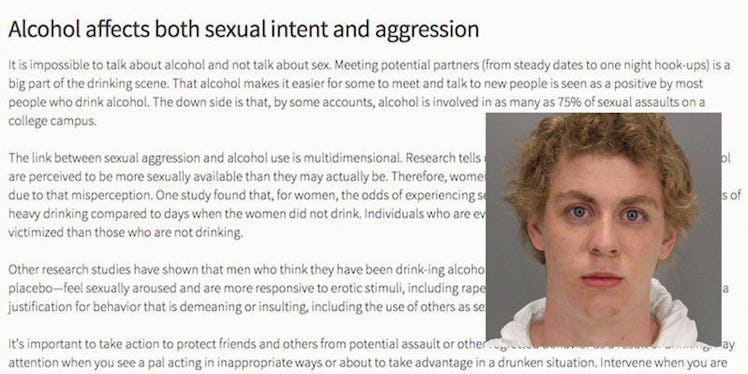
Stanford Bans Liquor, Posts Warning: Alcohol Arouses Men In 'Rape Scenarios'
On Monday, Stanford University announced hard alcohol will no longer be allowed at on-campus parties.
Beer and wine are still permitted at these parties, but any drink that is more than 20 percent alcohol or 40 proof has been banned. Lastly, only bottles of hard liquor smaller than 750 milliliters are allowed to be kept by students in their dorms.
Ralph Castro, director of the Office of Alcohol Policy and Education, said, "Our focus is on the high risk of the rapid consumption of hard alcohol," adding that their goal "is not a total prohibition of a substance, but rather a targeted approach that limits high-risk behavior."
Many believe this change in policy stems from the fallout of the highly-publicized Brock Turner rape case, wherein a Stanford freshman was convicted on three counts of sexually assaulting an unconscious woman while on school grounds.
Turner's defense attorneys repeatedly cited the perils of drinking as a mitigating factor for the actions of their client, who left his victim half-naked and unconscious behind a dumpster.
Now, with the implementation of this new policy, Stanford University has been accused of engaging in victim-blaming (Turner's victim was severely intoxicated at the time of her attack), and tacitly siding with Turner's argument that alcohol explains and mitigates his actions.
In a letter written to the judge overseeing his case, obtained by The Guardian, Turner blamed the events of that night on “alcohol” and “party culture,” and claimed that he never wants to attend “a social gathering that involves alcohol or any situation where people make decisions based on the substances they have consumed."
This statement, of course, implies that any reasonable person who has had too much to drink might accidentally end up sexually violating an unconscious woman behind a dumpster, and then running away when caught.
Turner, his father, his defense lawyers and the judge (who gave him only six months, even though he faced up to 14 years) all treated the rape as something that happened to Turner because of alcohol, not something he did to someone.
Stanford has denied the Turner case had any impact on their decision to change their policy regarding hard alcohol, but few are buying that.
To make matters worse, after announcing this new policy Stanford posted a "Female Bodies and Alcohol" page, meant to educated women on alcohol intake. San Francisco-based education reporter Elena Kadvany noticed that the page included an entire section titled "Alcohol affects both sexual intent and aggression."
It has since been deleted.
The language in that deleted section is both extremely troubling and indicative of the university's mindset while they were drafting this new policy.
The section included lines like these:
One study found that, for women, the odds of experiencing sexual aggression were 9 times higher on days of heavy drinking compared to days when the women did not drink. Individuals who are even a little intoxicated are more likely to be victimized than those who are not drinking.
The implication being that if Turner's victim didn't want to be raped, she shouldn't have had so much to drink. It is a similar argument to, "Don't dress provocatively if you don't want to be attacked." It is victim-blaming 101.
And this next portion of the deleted section basically takes its script directly from Turner's own defense attorneys' playbook.
Other research studies have shown that men who think they have been drink- ing alcohol—even when they have only consumed a placebo—feel sexually aroused and are more responsive to erotic stimuli, including rape scenarios. For some, being drunk serves as a justification for behavior that is demeaning or insulting, including the use of others as sexual objects.
Paired with all the implied victim-blaming and assailant-excusing is simply the fact that many believe the ban on alcohol won't do anything.
Students have been getting away with drinking underage in schools around the country consistently for decades. Turner himself was underage during the sexual assault.
In fact there are worries that making students drink in their dorms before they go out will actually increase alcohol intake.
Many are suspicious Stanford is not particularly interested in actually bringing down alcohol consumption, but in saving face after the Turner case, which put the school in hot water.
Turner's victim, who has chosen to remain anonymous, gained national attention for her heartbreaking and thought-provoking open letter to Turner and his defense attorneys, which she read aloud in the courtroom, regarding rape culture on and off campus in America.
In a phone interview, she continued to take the mistaken focus on drinking in rape cases to task:
People need to know that this way of thinking is dangerous. It's threatening. More than my emotions, it's my safety, everyone else's safety. It's not just me feeling sad and defeated. It's honest fear.
You can read her full letter here. I really suggest you do.